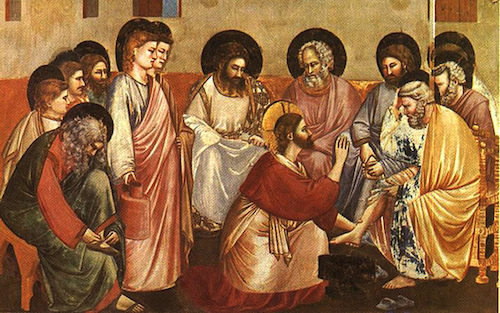We run our website the way we wished the whole internet worked: we provide high quality original content with no ads. We are funded solely by your direct support. Please consider supporting this project.

Living Incarnationally
The Christian faith is centered on the belief that in Jesus Christ God became a human being. This is commonly referred to as the doctrine of the incarnation. It means that in Jesus, God became embodied. God left the blessed domain of heaven, was born in Bethlehem, and took on our humanity that we might share in the blessedness of heaven. He took on our sin so that we might share in his righteousness. He entered the domain of Satan’s oppressive reign to free us and transform the world into a domain of his loving reign. Jesus is God’s loving embodiment in the world.
As the embodiment of God, Jesus perfectly manifested what God is like. This is why the New Testament authors refer to Jesus as the Word of God (John 1:1), the image of God (Col 1:15), and the perfect expression of God’s very essence (Heb 1:3). It’s why Jesus could say, “Anyone who has seen me has seen the Father” (John 14:9). Because Jesus is the embodiment of God, all of our thinking about God must be centered upon him.
But the earliest Christians understood that the incarnation wasn’t just about what God did once upon a time in Jesus. Because Jesus reveals who God really is, the incarnation tells us something about what God is always doing. It’s also about the incarnation of God today. While there’s only one incarnate Son of God, God is always embodying himself in the world. He does this primarily by identifying with those who submit their lives to him.
This is why Jesus followers are collectively referred to as “the Body of Christ.” We are, in a very real sense, an extension of Jesus’ earthly body. We are God’s hands, feet, and mouth in the world.
This is illustrated by the two volumes written by Luke. The gospel of Luke is about the ministry of Jesus, and Acts is about the early church. Luke opens Acts by noting that in his “former book” he wrote about “all that Jesus began to do and to teach” (Acts 1:1). The second book then is about all that Jesus continues to do and to teach. The Gospel was about what God did through Jesus’ incarnate body, while Acts is about what God continues to do through Jesus’ second, corporate body.
The followers of Jesus are called to imitate God in all things (Eph 5:1-2). This includes imitating his incarnational love in the ways we fully enter into the life of others. We are called to live incarnationally. Jesus reveals that God is a God who is willing to set aside the blessedness of his own domain and become fully present to others. So too, we are called to be a people who are willing to set aside the comforts and conveniences of our own lives and become fully present to others. This is part of what it means to “be imitators of God” and “live in love as Christ loved us and gave his life for us” (Eph 5:1-2). As we live incarnationally, God himself is continuing to be embodied in the world.
—Adapted from Present Perfect, pages 118-120
Photo credit: paukrus via VisualHunt / CC BY
Category: General
Tags: Body of Christ, Incarnation, Jesus
Topics: Following Jesus
Related Reading

Following Jesus from the Margins
D. Sharon Pruitt via Compfight Kurt Willems posted a reflection today entitled From the Margins: Following Jesus in a post-Christian culture. I hope everyone will read this. It’s a perspective from the anabaptist tradition that finds inspiration from the same data that evangelicalism finds alarming. May we all follow Jesus from the margins and offer…

The Incarnation: More Than a Rescue Mission
A mistake people often make concerning the Incarnation is that they fail to distinguish the eternal plan of God to unite himself with humanity in Christ, on the one hand, from the atoning significance this plan acquired after the fall, on the other. Some therefore think of the Incarnation as a sort of “Plan B”…

Classical Theism’s Unnecessary Paradoxes
The traditional view of God that is embraced by most—what is called “classical theology”—works from the assumption that God’s essential divine nature is atemporal, immutable, and impassible. The Church Fathers fought to articulate and defend the absolute distinction between the Creator and creation and they did this—in a variety of ways—by defining God’s eternal nature…

What Jesus Revealed About Being Human
According to the creation story, when Adam and Eve ate the fruit, they essentially ceased being the wonderful, God-centered, God-dependent human beings the Creator intended them to be. They became less than fully human. Instead, they began using everything and everyone in the world as surrogate gods, trying to get from people, deeds, and things…

Loving a Twilight Zone God?
David D. Flowers posted this insightful reflection over on his blog about an episode of The Twilight Zone and what it says about some pop views of God. Can we really love a God that exercises this kind of random control just because he can? We can certainly fear a God like this, but can…

How To Fix The Church: The Kingdom of God (Part 4)
God has leveraged everything on the Church loving like Jesus loved, as outlined in our previous posts in this series. “By this the world will know you are my disciples,” Jesus said, “by your love” (Jn 13:35). By God’s own design, Christ-like love is supposed to be the proof that Jesus is real. In John…
